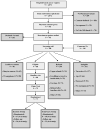Randomized controlled trial of aerobic exercise on insulin and insulin-like growth factors in breast cancer survivors: the Yale Exercise and Survivorship study
- PMID: 19124513
- PMCID: PMC2841479
- DOI: 10.1158/1055-9965.EPI-08-0531
Randomized controlled trial of aerobic exercise on insulin and insulin-like growth factors in breast cancer survivors: the Yale Exercise and Survivorship study
Abstract
Background: High insulin and insulin-like growth factor-I (IGF-I) levels may be associated with an increased breast cancer risk and/or death. Given the need to identify modifiable factors that decrease insulin, IGF-I, and breast cancer risk and death, we investigated the effects of a 6-month randomized controlled aerobic exercise intervention versus usual care on fasting insulin, IGF-I, and its binding protein (IGFBP-3) in postmenopausal breast cancer survivors.
Methods: Seventy-five postmenopausal breast cancer survivors were identified from the Yale-New Haven Hospital Tumor Registry and randomly assigned to an exercise (n = 37) or usual care (n = 38) group. The exercise group participated in 150 minutes per week of moderate-intensity aerobic exercise. The usual care group was instructed to maintain their current physical activity level. A fasting blood sample was collected on each study participant at baseline and 6 months. Blood levels of insulin and IGF were measured with ELISA.
Results: On average, exercisers increased aerobic exercise by 129 minutes per week compared with 45 minutes per week among usual care participants (P < 0.001). Women randomized to exercise experienced decreases in insulin, IGF-I, and IGFBP-3, whereas women randomized to usual care had increases in these hormones. Between-group differences in insulin, IGF-I, and IGFBP-3 were 20.7% (P = 0.089), 8.9% (P = 0.026), and 7.9% (P = 0.006), respectively.
Conclusions: Moderate-intensity aerobic exercise, such as brisk walking, decreases IGF-I and IGFBP-3. The exercise-induced decreases in IGF may mediate the observed association between higher levels of physical activity and improved survival in women diagnosed with breast cancer.
Figures
Comment in
-
Unbalanced cancer status may undermine results on insulin and insulin-like growth factor.Cancer Epidemiol Biomarkers Prev. 2009 Jul;18(7):2150; author reply 2150. doi: 10.1158/1055-9965.EPI-09-0231. Cancer Epidemiol Biomarkers Prev. 2009. PMID: 19589916 No abstract available.
References
-
- Goodwin P, Ennis M, Pritchard K, et al. Fasting insulin and outcome in early-stage breast cancer: Results of a prospective cohort study. J of Clin Oncol. 2002;20(1):42–51. - PubMed
-
- Pollak MN, Chapman JW, Shepherd L, et al. Insulin resistance, estimated by serum C-peptide level, is associated with reduced event-free survival for postmenopausal women in NCIC CTG MA.14 adjuvant breast cancer trial. J Clin Oncol. 2006;24(suppl 18S):9s. abstr 524.
-
- Irwin ML, Ballard-Barbash R, McTiernan A, et al. Fasting C-peptide levels and breast cancer death. American Association of Cancer Research Frontiers in Cancer Prevention Meeting; December 2007; Abstract B99.
-
- Abrahamson PE, Gammon MD, Lund MJ, et al. General and abdominal obesity and survival among young women with breast cancer. Cancer Epidemiol Biomarkers Prev. 2006;15(10):1871–7. - PubMed
Publication types
MeSH terms
Substances
Grants and funding
LinkOut - more resources
Full Text Sources
Medical
Miscellaneous


